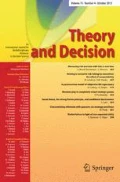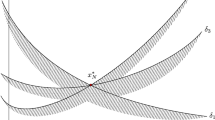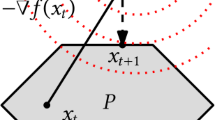Abstract
In this paper the Hurwicz decision rule is applied to an adjustment problem concerning the decision whether a given action should be improved in the light of some knowledge on the states of nature or on other actors' behaviour. In comparison with the minimax and the minimin adjustment principles the general Hurwicz rule reduces to these specific classes whenever the underlying loss function is quadratic and knowledge is given by an ellipsoidal set. In the framework of the adjustment model discussed in this paper Hurwicz's optimism index can be interpreted as a mobility index representing the actor's attitude towards new external information. Examples are given that serve to illustrate the theoretical findings.
Similar content being viewed by others
REFERENCES
Arnold, B.F. and Stahlecker, P. (1999), Minimax adjustment technique and fuzzy information. Linear Algebra and its Applications 289, 25–39.
Arnold, B.F. and Stahlecker, P. (2000), The minimax adjustment principle. Mathematical Methods of Operations Research 51, 103–113.
Bamberg, G. and Coenenberg, A. G. (1994), Betriebswirtschaftliche Entscheidungslehre (in German), München: Vahlen.
Bandemer, H. and Gottwald, S. (1995), Fuzzy sets, fuzzy logic, fuzzy methods with applications, Chichester: Wiley.
Berger, J.O. (1980), Statistical Decision Theory, Foundations, Concepts, and Methods, New York: Springer.
Pilz, J. (1991) Bayesian Estimation and Experimental Design in Linear Regression, 2nd ed., New York: Wiley.
Rockafellar, R.T. (1970), Convex Analyss, Princeton: Princeton University Press.
Rothenberg, T.J. (1973), Efficient Estimation with A Priori Information, New Haven: Yale University Press.
Sion, M. (1958), On general minimax theorems. Pacific Journal of Mathematics 8, 171–176.
Stahlecker, P., Größl, I. and Arnold, B.F. (1999), Monopolistic competition and supply behaviour under fuzzy price information, Homo Oeconomicus XV(4), 561–579.
Stahlecker, P., Knautz, H. and Trenkler, G. (1996), Minimax adjustment technique in a parameter restricted model, Acta Applicandae Mathematicae 43, 139–144.
Zimmermann, H.-J. (1996), Fuzzy Set Theory and its Applications,3rd ed., Dordrecht: Kluwer Academic Publishers.
Author information
Authors and Affiliations
Rights and permissions
About this article
Cite this article
Arnold, B.F., Größl, I. & Stahlecker, P. The Minimax, the Minimin, and the Hurwicz Adjustment Principle. Theory and Decision 52, 233–260 (2002). https://doi.org/10.1023/A:1019602429921
Issue Date:
DOI: https://doi.org/10.1023/A:1019602429921




